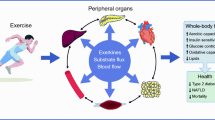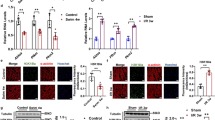Abstract
EPA has been clinically shown to reduce muscle wasting during cancer cachexia. This study investigates whether curcumin or green tea extract (GTE) enhances the ability of low doses of eicosapentaenoic acid (EPA) to reduce loss of muscle protein in an in vitro model. A low dose of EPA with minimal anti-cachectic activity was chosen to evaluate any potential synergistic effect with curcumin or GTE. Depression of protein synthesis and increase in degradation was determined in C2C12 myotubes in response to tumour necrosis factor-α (TNF-α) and proteolysis-inducing factor (PIF). EPA (50 μM) or curcumin (10 μg ml−1) alone had little effect on protein degradation caused by PIF but the combination produced complete inhibition, as did the combination with GTE (10 μg ml−1). In response to TNF-α (25 ng ml−1)-induced protein degradation, EPA had a small, but not significant effect on protein degradation; however, when curcumin and GTE were combined with EPA, the effect was enhanced. EPA completely attenuated the depression of protein synthesis caused by TNF-α, but not that caused by PIF. The combination of EPA with curcumin produced a significant increase in protein synthesis to both agents. GTE alone or in combination with EPA had no effect on the depression of protein synthesis by TNF-α, but did significantly increase protein synthesis in PIF-treated cells. Both TNF-α and PIF significantly reduced myotube diameter from 17 to 13 μm for TNF-α (23.5%) and 15 μm (11.8%) for PIF However the triple combination of EPA, curcumin and GTE returned diameters to values not significantly different from the control. These results suggest that either curcumin or GTE or the combination could enhance the anti-catabolic effect of EPA on lean body mass.






Similar content being viewed by others
References
Alamdari N, O’Neal P, Hasselgren PO (2009) Curcumin and muscle wasting: a new role for an old drug? Nutrition 25:125–129
Bachmann J, Heiligensetzer M, Krakowski-Roosen H, Büchler MW, Friess H, Martignoni ME (2008) Cachexia worsens prognosis in patients with resectable pancreatic cancer. J Gastrointest Surg 12:1193–1201
Barber MD, Ross JA, Voss AC, Tisdale MJ, Fearon KC (1999) The effect of an oral nutritional supplement enriched with fish oil on weight-loss in patients with pancreatic cancer. Br J Cancer 81:80–86
Barber MD, Fearon KC, Tisdale MJ, McMillan DC, Ross JA (2001) Effect of a fish oil-enriched nutritional supplement on metabolic mediators in patients with pancreatic cancer cachexia. Nutr Cancer 40:118–124
Dewys WD, Begg C, Lavin PT, Band PR, Bennett JM, Bertino JR et al (1980) Prognostic effect of weight loss prior to chemotherapy in cancer patients. Eastern Cooperative Oncology Group. Am J Med 69:491–497
Eley HL, Tisdale MJ (2007) Skeletal muscle atrophy, a link between depression of protein synthesis and increase in degradation. J Biol Chem 282:7087–7097
Eley HL, Russell ST, Tisdale MJ (2008) Attenuation of depression of muscle protein synthesis induced by lipopolysaccharide, tumor necrosis factor, and angiotensin II by beta-hydroxy-beta-methylbutyrate. Am J Physiol Endocrinol Metab 295:E1409–E1416
Fearon KC, Von Meyenfeldt MF et al (2003) Effect of a protein and energy dense N-3 fatty acid enriched oral supplement on loss of weight and lean tissue in cancer cachexia: a randomised double blind trial. Gut 52:1479–1486
Hussey HJ, Tisdale MJ (1999) Effect of a cachectic factor on carbohydrate metabolism and attenuation by eicosapentaenoic acid. Br J Cancer 80:1231–1235
Koretz RL (2007) Should patients with cancer be offered nutritional support: does the benefit outweigh the burden? Eur J Gastroenterol Hepatol 19:379–382
Loprinzi CL, Schaid DJ, Dose AM, Burnham NL, Jensen MD (1993) Body-composition changes in patients who gain weight while receiving megestrol acetate. J Clin Oncol 11:152–154
Mantovani G, Macciò A, Massa E, Madeddu C (2001) Managing cancer-related anorexia/cachexia. Drugs 61:499–514
Milacic V, Banerjee S, Landis-Piwowar KR, Farkar FH, Majumdar AP, Dou QP (2008) Curcumin inhibits the proteasome activity in human colon cancer cells in vitro and in vivo. Cancer Res 68:7283–7292
Mirza KA, Pereira SL, Edens NK, Tisdale MJ (2014) Attenuation of muscle wasting in murine C2C12 myotubes by epigallocatechin-3-gallate. J Cachexia Sarcopenia Muscle 5:339–345
Poylin V, Fareed MU, O’Neal P, Alamdari N, Reilly N, Menconi M, Hasselgren PO (2008) The NF-kappaB inhibitor curcumin blocks sepsis-induced muscle proteolysis. Mediators Inflamm 2008:317851
Ryan AM, Reynolds JV, Healy L, Byrne M, Moore J, Brannelly N, McHugh A, McCormack D, Flood P (2009) Enteral nutrition enriched with eicosapentaenoic acid (EPA) preserves lean body mass following esophageal cancer surgery: results of a double-blinded randomized controlled trial. Ann Surg 249:355–363
Sanchex-Lara K, Turcott JG, Juarez-Hernandez E, Nunez-Valencia C, Villanueva G, Guevara P, De la Torre V, Mohar A, Arrieta O (2014) Effects of an oral nutritional supplement containing eicosapentaenoic acid on nutritional and clinical outcomes in patients with advanced non-small cell lung cancer: randomised trial. Clin Nutr 33:1017–1023
Siddiqui RA, Hassan S, Harvey KA, Rasool T, Das T, Mukerji P, DeMichele S (2009) Attenuation of proteolysis and muscle wasting by curcumin c3 complex in MAC16 colon tumour-bearing mice. Br J Nutr 102:967–975
Smith HJ, Lorite MJ, Tisdale MJ (1999) Effect of a cancer cachectic factor on protein synthesis/degradation in murine C2C12 myoblasts: modulation by eicosapentaenoic acid. Cancer Res 59:5507–5513
Smith DM, Wang Z, Kazi A, Li LH, Chan TH, Dou QP (2002) Synthetic analogs of green tea polyphenols as proteasome inhibitors. Mol Med 8:382–392
Smith HJ, Greenberg NA, Tisdale MJ (2004) Effect of eicosapentaenoic acid, protein and amino acids on protein synthesis and degradation in skeletal muscle of cachectic mice. Br J Cancer 91:408–412
Thaloor D, Miller KJ, Gephart J, Mitchell PO, Pavlath GK (1999) Systemic administration of the NF-kappaB inhibitor curcumin stimulates muscle regeneration after traumatic injury. Am J Physiol 277:C320–C329
Tisdale MJ (2009) Mechanisms of cancer cachexia. Physiol Rev 89:381–410
Van der Meij BS, Langius JA, Smit EF, Spreeuwenberg MD, von Blomberg BM et al (2010) Oral nutritional supplements containing (n-3) polyunsaturated fatty acids affect the nutritional status of patients with stage III non-small cell lung cancer during multimodality treatment. J Nutr 140:1774–1780
Van der Meij BS, Langius JA, Spreeuwenberg MD, Slootmaker SM, Paul MA, Smit EF, van L (2012) Oral nutritional supplements containing (n-3) polyunsaturated fatty acids affect quality of life and functional status in lung cancer patients during multimodality treatment: an RCT. Eur J Clin Nutr 66:399–404
Wang H, Lai YJ, Chan YL, Li TL, Wu CJ (2011) Epigallocatechin-3-gallate effectively attenuates skeletal muscle atrophy caused by cancer cachexia. Cancer Lett 305:40–49
Whitehouse AS, Tisdale MJ (2003) Increased expression of the ubiquitin-proteasome pathway in murine myotubes by proteolysis-inducing factor (PIF) is associated with activation of the transcription factor NF-kappaB. Br J Cancer 89:1116–1122
Wyke SM, Russell ST, Tisdale MJ (2004) Induction of proteasome expression in skeletal muscle is attenuated by inhibitors of NF-kappaB activation. Br J Cancer 91:1742–1750
Author information
Authors and Affiliations
Corresponding author
Ethics declarations
This work was supported by a grant from Abbott Nutrition, Columbus, OH, USA. Kamran Ali Mirza and Michael J Tisdale declare that they have no conflict of interest. Menghua Luo, Suzette Pereira, Anne C Voss, and Tapas Das are employees of Abbott Nutrition.
Additional information
Editor: Tetsuji Okamoto
Rights and permissions
About this article
Cite this article
Mirza, K.A., Luo, M., Pereira, S. et al. In vitro assessment of the combined effect of eicosapentaenoic acid, green tea extract and curcumin C3 on protein loss in C2C12 myotubes. In Vitro Cell.Dev.Biol.-Animal 52, 838–845 (2016). https://doi.org/10.1007/s11626-016-0051-z
Received:
Accepted:
Published:
Issue Date:
DOI: https://doi.org/10.1007/s11626-016-0051-z




